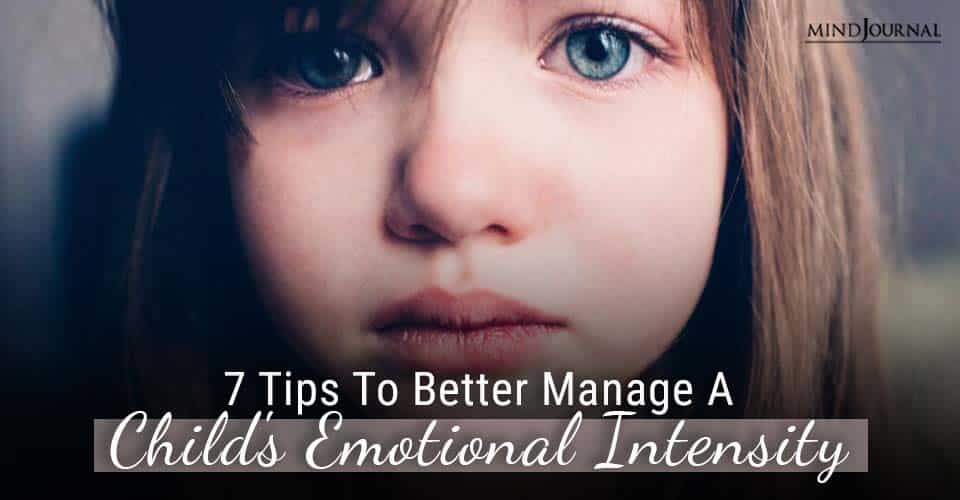When Every Emotion Is Too Big and Too Loud. Seven tips to help parents manage your sensitive child’s emotional intensity.
This intensity refers to how gifted individuals approach life. At its best, the intensity is the driving passion that enables some people to achieve amazing things—in any domain. But at its worst, it is the turmoil that has the power to consume these same individuals from time to time as they learn how to manage that aspect of their personality.
Intensity comes in the form of cognitive intensity—those aspects of thinking and processing information that all gifted individuals use to problem-solve. It relates to the attributes of focus, sustained attention, creative problem solving, and advanced reasoning skills. Most people think of cognitive intensity as intellect, or “being smart”—all good things.
But a gifted child’s intensity does not stop there. The emotional aspects of a gifted individual are also intense. Emotional intensity refers to the passion that gifted people feel daily. It also refers to the extreme highs and lows many gifted people experience throughout their lifetime, causing them to question their mental stability from time to time. This type of intensity is a natural aspect of giftedness. However, in my experience, it is also one of the most misunderstood attributes—and it is the reason gifted kids sometimes struggle.
Typically, emotional intensity results in a range of behavioral outbursts that can be internal (including moodiness, anxiety, and depression) or external (yelling or crying, temper tantrums, and physical expressions of anger or frustration).
Regardless of how a gifted child chooses to demonstrate his or her intensities, there are a lot of things parents and educators can do to help lessen the outbursts and teach coping strategies.
Here Are 7 Ways You Can Handle Your Gifted Child’s Emotional Intensity
1. Start early by teaching the child how to talk about his or her emotions.
Trust me, they may not want to—but taking the emotions from some raw feeling to a tangible thing that can be defined is a crucial first step in learning to control the behavior.
Further, the development of an emotional vocabulary can assist in providing a common language with which to discuss emotions and behavior.
2. Help the child discover his or her unique escalation cycle.
Work to identify both your child’s and your escalation patterns. Gifted kids have a considerable talent for pushing a teacher or parent’s buttons. Knowing the things that drive you over the edge will enable you to remain calm during emotional outbursts, whatever form they may take.
Further, helping children discover their escalation patterns will give them a chance to learn to manage and redirect their feelings before they become too overwhelming.
Related: 10 Scientifically Proven Tips To Raise Happy Kids
3. Develop a plan to deal with the intensity.
Once the escalation cycle for you and your children is identified, develop responsive strategies with your child. These strategies could include relaxation techniques, ways to redirect his or her energies, and things to do instead of the internal or external explosion.
4. Create an emotional distance from the outburst.
Should the explosion happen anyway, it is essential to remain calm and create space between your emotions and your children’s. Anger and frustration always beget more anger and frustration, so it is necessary for the adults working with the child to stay emotionally neutral.
5. Take a breather.
This goes for children and adults. The best way to create the distance I talked about above is to remember to take a break and calm down.
6. Focus on the behavior you want to see, not only the inappropriate behavior you see.
Remember to focus on the good behavior you want to see. All too often, we get into a pattern of responding to the negative behaviors strongly (because these behaviors emotionally hook us) and not responding enough to the positive behaviors.
The result—more negative behaviors. So do a mental inventory and make sure to focus your time and energy on the positive behaviors.
Related: How To Raise A Child With High EQ
7. View behavioral outbursts, whether internal or external, are teachable moments.
Yes, they are frustrating and annoying. Maybe even infuriating. But they are still teachable moments. Take the time to redirect the behavior, focusing on teaching the child how to understand and redirect the behavior.
The bottom line to all of this: Intensity is not a bad thing in and of itself. Intensity is passion—the kind of passion we use to create. It is the coping strategies of the child, or lack thereof, that are often the problem. Utilizing the techniques above will help you and your children embrace the intensity and recognize it for what it is—a fascinating aspect of what it means to be gifted in the first place.
Written By Christine Fonseca
Originally Appeared In Psychology Today
When you are trying to handle your gifted child’s emotional intensity, you need to be smart and tactful about it, because how you are handling them now can set the course for the kind of relationship you will have with them in the future. If you have trouble with this, follow these useful and effective pointers, and you will see for yourself how easier it gets with time.










Leave a Reply